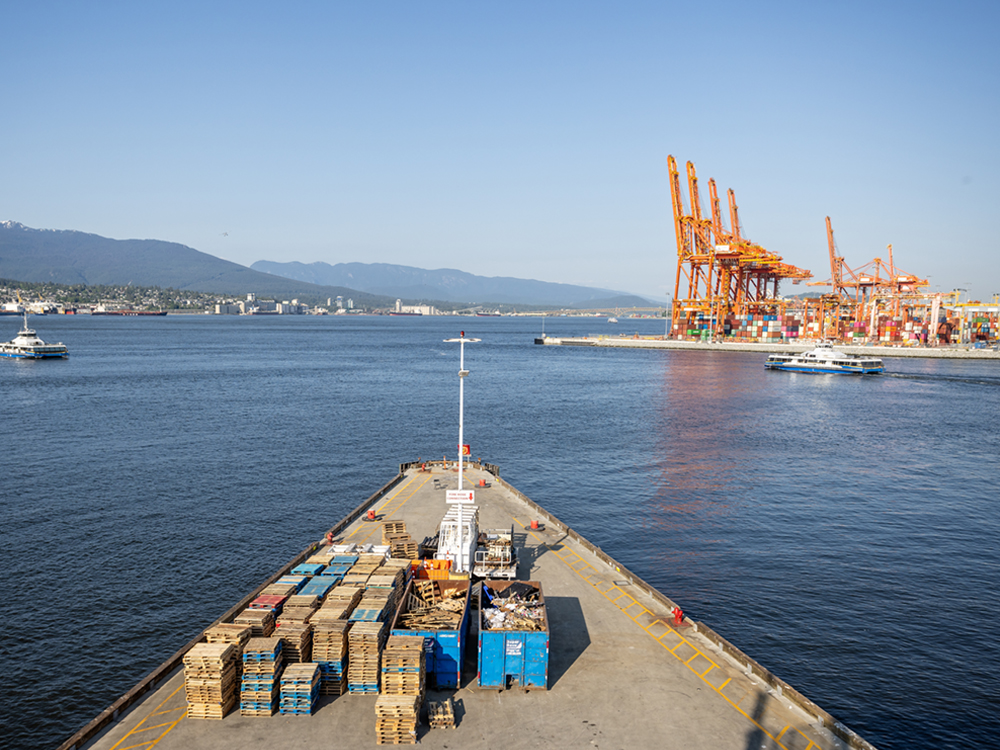Two weeks ago, B.C.’s dockworkers were on the verge of endorsing a contract that would have ended an 18-day strike.
But when the 70-member elected contract caucus of the International Longshore and Warehouse Union, or ILWU, reviewed the proposed deal, one word gave them pause.
The agreement with the BC Maritime Employers Association, reached with the help of a federal government mediator, included the provision that “regular” maintenance work would continue to be done by union members.*
Two sources who saw and reviewed that deal said the caucus believed the word — “regular” — was too vague. They worried employers would use it as a pretext to cut maintenance jobs and outsource work to contractors.
The caucus voted to reject it. That led to days of strife on the docks, after a brief, aborted strike and speculation the federal government might legislate stevedores back to work.
The union’s caucus held a second vote and approved the deal. The ILWU executive submitted it to a membership vote, recommending acceptance.
But last Friday, the union’s eligible members also turned down the deal.
Now there’s a new proposed agreement, announced late Sunday night after federal Labour Minister Seamus O’Regan said a contract would be forced on workers and employers if they couldn’t find a deal at the table.
It is the latest twist in a labour dispute at B.C. docks that business groups say has snarled supply chains, held up billions of dollars in trade and tarnished Canada’s reputation as a global trading partner.
The ILWU, which represents about 7,400 dockworkers in the Lower Mainland and Prince Rupert, said in a statement on Sunday that preventing the outsourcing of maintenance work was the “critical” issue in the dispute.
“While ILWU Canada recognizes the need for a competitive and efficient maritime industry, this should not displace skilled and experienced workers who have dedicated their careers to ensuring the smooth functioning of Canada’s West Coast ports,” ILWU president Rob Ashton said in a statement.
“We are deeply concerned that, if unchecked, this practice will lead to an erosion of our workforce and expertise, ultimately jeopardizing the stability and efficiency of Canada’s maritime industry.”
One source close to the negotiations told The Tyee that the revised agreement the parties reached on Sunday includes provisions that will attempt to protect those jobs.
Here’s how the battle on the docks turned into a month-long brawl and what’s at stake as workers are once again expected vote on a deal this week.
The strike begins
The ILWU began their strike on Canada Day, halting hundreds of millions of dollars in trade at 30 ports across the province.
That includes the Port of Vancouver, the third-busiest port in North America. The port estimates it handled more than $300 billion in cargo in 2022 alone.
Some goods, like coal and grain, continued to flow. But for the most part, the strike halted commercial traffic as workers lobbied for better wages, job security and protection from automation.
Their previous contract expired in March.
O’Regan came to Vancouver for meetings as business groups clamoured for him to force an end to the strike. But O’Regan’s tone was conciliatory. He urged the parties to reach a deal quickly but said they should do so on their own terms.
“Collective bargaining is hard work but it's how the best, most resilient deals are made,” O’Regan said on July 4.
The next week, O’Regan appointed a federal mediator to propose a deal to the BC Maritime Employers Association and the ILWU and gave both parties 24 hours to accept. They did, and the picket lines came down.
But the ILWU’s constitution stipulated that its 70-member contract caucus needed to approve the deal before it could go to members.
That’s where the concern about the term “regular” arose.
Members worried the definition of “regular maintenance” could let the 49 members of the employers’ group cut maintenance jobs and outsource that work to contractors, something that has caused ILWU job losses for years.
The contract caucus’s 70 member delegates narrowly voted to reject the deal on July 18.
Mark Thompson, a professor emeritus at the UBC Sauder School of Business, is a former labour mediator who worked on a port dispute in the 1990s.
Thompson said the ILWU is famously protective of the high-paying jobs at the docks, which are threatened both by automation and by employers’ desires to cut full-time positions in favour of contractors. He added that the union’s own executive had clearly misjudged how vital that would be to elected delegates.
“Protecting those jobs is very important to that union,” Thompson said in an interview last week.
On the same day, the ILWU announced it would immediately resume picketing the province’s ports. The union said that it had brought down picket lines as a show of good faith, but was still in a legal strike position.
But employers disagreed. The BCMEA challenged the legality of the strike with the Canada Industrial Relations Board, a federal tribunal that has jurisdiction in federally regulated workplaces like docks and airports. The employers argued the ILWU had to give 72 hours’ notice before beginning their strike.
“Essentially, the union’s argument here is that this is simply the continuation of a strike that was already on, for which they had provided required notice,” said Sara Slinn, a professor of law specializing in labour at York University.
Within the hour, the CIRB had scheduled a case management conference headed by the board’s chair. A hearing began at 9:30 p.m. that evening and did not stop until roughly 1:30 a.m.
Just six hours later, the board declared the strike illegal, agreeing with employers. The picket lines came down.
The ILWU has since filed a federal court application challenging the decision. In their statement of claim, the union argues the board “substantially interfered with the collective bargaining process” and took away their leverage by preventing them from “placing economic pressure on the respondent through the lawful use of job action at a critical point in their labour dispute.”
But the union couldn’t go on strike for three days. And the federal government signalled it was prepared to intervene.
Prime Minister Justin Trudeau convened an emergency response team to discuss the strike. And O’Regan said he was now “looking at all options” to get the ports moving.
“Every effort has been made. But this cannot go on,” O’Regan said on Twitter.
The ILWU were concerned that could mean legislation forcing members back to work.
The union withdrew their strike notice and convened a second caucus vote. This time, it passed.
The union’s executive, who had helped negotiate that deal, recommended their members vote to pass it.
On Friday night, the ILWU announced the results: members had rejected the agreement.
The ILWU did not release the tally of the vote. The union’s voting membership is smaller than the number of employees it represents because many workers are casual and do not have full voting rights.
Charles Smith, a professor of political studies at St. Thomas More College at the University of Saskatchewan, said the Liberal federal government was trying to walk a tightrope between its business-friendly base and its allies in organized labour.
But Smith said O’Regan’s rhetoric may have backfired, causing some union members to dig in. Smith said it’s also not surprising the membership rejected a deal, given their own elected delegates had originally turned it down.
“Rather than the minister saying we have to go back to the drawing board, he’s saying this is too damaging,” Smith said. “All strikes are damaging to the local economy. That’s the point of a strike. That’s how you put pressure on the parties.”
Bea Bruske, the president of the Canadian Labour Congress, said bargaining often happens faster without outside intervention.
“External interference in collective bargaining for the sake of expediency, convenience and/or optics, only undermines this important process and often delays a positive outcome,” Bruske said in a written statement.
In a statement, BCMEA said the union’s members would have received a 19.2-per-cent compounded wage agreement over the four-year term, a signing bonus of about $3,000 per member and an 18.5-per-cent increase to a modernization and mechanization fund, a retirement payment created to address concerns about job losses caused by automation. The BCMEA said that payment would have been valued at $96,250 by 2026.
The employers’ association said the ILWU members’ decisions had “left Canadians, businesses and the entire supply chain in a perilous state that has cost billions.” The employers added that “disconnect within ILWU Canada and their erratic actions of the past month have impacted Canadians for too long.”
The next day, O’Regan intervened. He announced if the parties didn’t reach a deal, the Canadian Industrial Relations Board board could either impose a contract or order binding arbitration.
The union and employers announced the new deal on Sunday night, following a lengthy meeting in Vancouver.
The next step was for the union and employers to decide whether they’d accept the new contract. Both had endorsed it to their respective memberships. B.C.'s port workers ratified a four-year contract agreement on Aug. 6, bringing a halt to the long running labour dispute. No details of the contract were released with the announcement.**
Smith, speaking before the deal was announced, said he disagreed with O’Regan’s decision to put the CIRB in charge of the contract.
“I think it’s passing the buck,” Smith said.
“The board isn’t there to make the political problems of the minister or the economic problems of employers go away,” Smith said. “It’s there to enforce the rules.”
Both parties have recommended the deal to their respective members. The CIRB’s chair, Ginette Brazeau, has ordered the ILWU to send its members a letter signed by all five local presidents endorsing the deal. The same order says the ILWU must hold its ratification vote with members no later than Aug. 4.
“The Board reminds ILWU leadership that it can be considered an unfair labour practice for union leadership to unanimously support a settlement agreement and subsequently change its position through the ratification process,” the board’s order says.
In the meantime, the union is not allowed to launch a strike nor is the employer able to lock out workers until the results of the ratification. Both parties have also been ordered by the CIRB to not speak to media beyond a single, identical statement.
* Story updated on Monday, Aug. 7 at 1:07 p.m. to reflect the contract word in question was "regular" rather than "normal" (which is the word two sources originally told The Tyee's reporter).
** Story updated on Monday, Aug. 7 at 1:07 p.m. to included news that union members voted for the latest contract wording on Saturday, Aug. 6. ![]()
Read more: Labour + Industry

















Tyee Commenting Guidelines
Comments that violate guidelines risk being deleted, and violations may result in a temporary or permanent user ban. Maintain the spirit of good conversation to stay in the discussion and be patient with moderators. Comments are reviewed regularly but not in real time.
Do:
Do not: